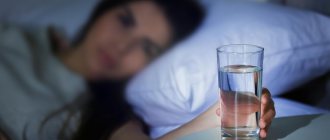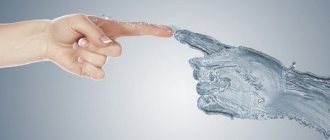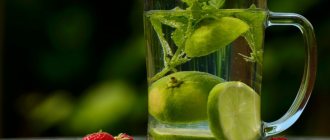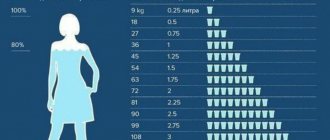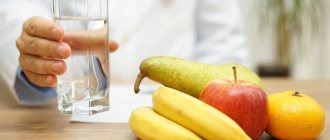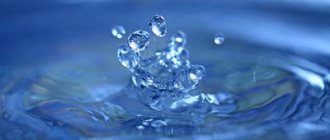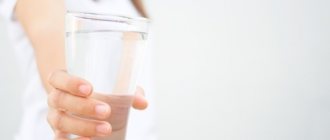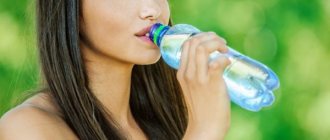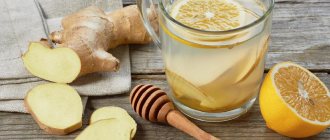Did you know that a glass of water can help you digest food faster and overcome constipation? Find out more in this article!
Be sure to drink a glass of water half an hour before meals, because it is very good for health.
Here it’s worth saying “a glass or less,” because drinking too much before a meal is also not very healthy. For example, two or three glasses sometimes make digestion difficult.
Therefore, the golden mean is to take a few sips of water to aid digestion. Another important question worth discussing is: “Is it healthy to drink water during meals?”
This isn't really about benefit or harm, but rather that it is "recommended."
Drinking a lot of liquid while eating can affect your stomach acid. It does not break down foods as effectively and is less effective at fighting bacteria that could have gotten inside with food.
No problem if, for example, you drink a glass of wine with dinner.
However, to optimize digestion and take better care of your health every day, it is recommended to drink a glass of water 30 minutes before meals.
Next, we will talk about all the health benefits of this habit.
Is it possible to do this?

It is needed for the normal functioning of the digestive system .
If there is not enough water, the stomach will begin to pull it from the intestines, and if the required amount is not found there, then it will have to be taken from the blood.
And the thicker the blood, the more diseases the body develops.
Is it possible to drink water immediately after eating?
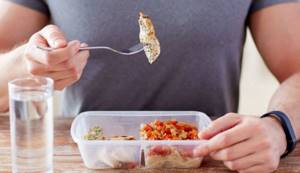
When is it recommended to drink water after meals? Some people think that you should drink immediately after lunch. Others are of the opinion that you can quench your thirst after 40-60 minutes. The starting point is the beginning or end of lunch. But is it possible to drink water after eating if the portion was larger than usual? Or when your dinner lasts for several hours?
To understand whether it is possible to drink water after eating, it is necessary to analyze another parameter, namely the time during which the food is digested. The fact is that drinking will be beneficial if the liquid enters an empty stomach. This is why they drink water after eating. After all, it takes part in all metabolic processes. At the same time, the liquid you drink does not interfere with the absorption of nutrients, which means that a person’s well-being improves.
Recommended articles on this topic:
- Types of water coolers: models, functions, photos
- Water cooler for the office: types and selection criteria
- How to improve water quality: traditional and folk methods
For example, you had a snack of ice cream (50-100 g). After 20-30 minutes, you can drink water, because what you eat will already be digested. Drinking the liquid will give you a feeling of satiety and keep your figure in great shape. On the contrary, if you don’t drink 1-2 glasses of water, there is a high probability that you will want something tasty, but completely unhealthy: sweets or baked goods.
The same time - about half an hour - is required to digest fresh berries, vegetables, and fruits. If you are a follower of a raw food diet, then the question of whether you can drink water after meals disappears for you. Feel free to drink water 30-40 minutes after eating: this is the optimal drinking regimen for raw foodists. However, if you eat this way all the time, most likely you will not be active and full of energy, and your performance will sharply decrease. All you can do is meditate, do light exercises, play board games, avoiding strong mental and physical stress.
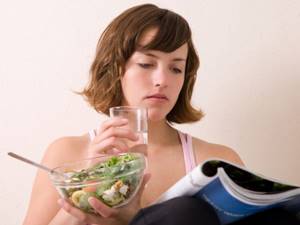
An average portion (two fistfuls) of cereals, baked goods and pasta, as well as stewed vegetables, broth without meat will be digested within 40-60 minutes. After this time, you can drink water.
Of course, such a light diet: veganism, macrobiotics, raw food diet will not provide you with the required energy if you play sports and build muscle mass. When you are experiencing heavy physical activity (bodybuilding, professional sports, fitness), food should be higher in calories than during intellectual work. Cottage cheese and milk should be included in the diet.
As an example, consider infant nutrition. They are fed 6 times a day, every three hours, for a reason, but because it takes exactly that long to digest milk.
In an adult, milk is also digested within 2.5-3 hours. During this period, the number of lactic acid bacteria in our body decreases significantly. Therefore, a glass of already partially prepared lactic acid product (ryazhenka or kefir) will leave the stomach faster. However, such food will be digested for at least an hour and a half (in a calm state). If a person is in a stressful situation, is engaged in heavy physical labor, or, conversely, is immobilized, then fermented milk products will take longer to digest. And this means that after drinking water an hour and a half later, you will consume it on a still full stomach.
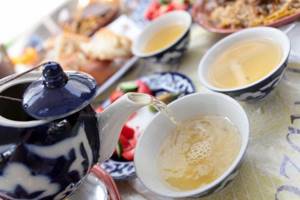
The optimal nutritional system, similar to the Mediterranean diet, is young vegetarianism. By eating this way, you can play sports, build muscles, and be active. White meat, fish and chicken are allowed. However, protein is completely absorbed in five to six hours. In this case, is it possible to drink water after eating to feel good and full of energy?
In addition, the physiological need of the body is to eat four to five times a day. Therefore, in order to adhere to this diet and drink, you will have to give up sleep. However, even a day will not be enough. Because water must be consumed not only after meals, but also before meals - an hour before meals. Otherwise, the liquid you drink will interfere with the proper production of gastric juice, which will also negatively affect your health.
Is one glass before meals beneficial?
There are several reasons why drinking some water before meals is beneficial:
- Digestion improves. Water can cleanse the digestive system of toxic substances, maintain a normal lymphatic system, and speed up the metabolic process and absorption of food.
- The stomach prepares for food intake. Immediately throwing food into the stomach is harmful to the body. This can be understood with an example. To make a fire, you will first need small, light twigs to help ignite the fire, and then large pieces of wood will be needed to generate heat and maintain the fire.
In the same way, the stomach needs to be prepared for eating. Water will help the digestive system begin to work gradually, and when the digestion process is started, then you can move on to heavier foods. The stomach will be able to adapt and digest the incoming food.
- The body is saturated with moisture. This is especially important in the morning before breakfast. After rest, the human body is dehydrated, and water will speed up metabolism.
- The feeling of hunger decreases. If your body signals a desire to eat, you don’t always need to run to the refrigerator. The brain may unintentionally confuse feelings of thirst and hunger.
Therefore, if you drink water in advance, the feeling of hunger will go away and then during the meal itself, the person will not eat so much.
And this helps prevent excess weight and helps control your figure.
Some experts argue that water consumed before meals dilutes gastric juice and interferes with its absorption. But that's not true.
Interesting!
The water in the stomach does not mix with hydrochloric acid, but enters the small intestine. Therefore, it cannot harm the digestion process in any way. And in order to somehow influence the pH values, you need to drink at least 4-5 liters.
Arguments of opponents: harmful or not
The first and most serious is intended for those who want to lose weight no matter what. Drinking during meals at lunch, dinner or breakfast, you stretch your own stomach. And the larger it is, the more it can fit in, the larger the portions, the stronger the appetite and the higher the number on the scale.
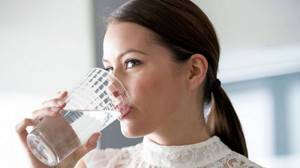
Why can't you drink water or other liquids with your food? Leading nutritionists are confident that the habit of pouring drinks into yourself during meals can turn into a real disaster for your body - in particular, the gastrointestinal tract. And that's why:
- When we swallow soda or juice, the secreted gastric juice dilutes, which contributes to disruption of digestive processes. Do you feel like you are turning into a heavy ball, experiencing discomfort and even pain? It’s all because of the liquid that you drank without hesitation. It slowed down the digestion of food, and it simply “stayed” in the body. It won't do any good in this form. Give up this habit, and after a short time you will feel that the discomfort will go away, and bloating and a feeling of heaviness will no longer bother you.
- Why is it dangerous to your health to liquefy the contents of your stomach while eating? The fact is that such softening of consumed dishes, the desire to “dilute” food with juice, water or tea leads to disappointing consequences - loss of bactericidal properties. You risk getting poisoned and contracting an infection, and this is a reason for serious consideration: whether to drink what you cook for breakfast, lunch and dinner or not. What about broths and other first courses? Are they also potentially harmful? No, because soups contain special extractive substances - they stimulate juice secretion and digestion.
- Imagine that you are washing down your meal. How do you do it? By taking a sip from a mug or glass for each portion sent into the mouth, we let unwanted air into the body, which later becomes the cause of increased gas formation. The intestines stretch, and the same air that has not had time to be absorbed into the blood leads to serious discomfort - rumbling, pain, bloating.
- Should I drink water with my food? A completely logical question - why? After all, we already get the fluid necessary for the body - from the food we consume daily. For example, in vegetables (such as cucumbers and tomatoes) the essential moisture is as much as 95%, in lean meat - from 50 to 70, and there is no need to even mention the first courses - there is more than enough of it. Learn to be content with what is beneficial and not harmful to your health and figure, and you will forget about the discomfort after breakfast, lunch and dinner.
If drinking while eating is so harmful, why do all restaurants in the world serve a glass of water to the table? The answer to this question is this: first, the visitor is asked to choose a liquid that serves as an accompaniment to the main dish, and they are allowed to try a kind of aperitif only 10-15 minutes before the meal. After tasting the culinary masterpieces, the guests also drink - but only after a pause, during which they are supposed to discuss what the waiter served, argue about tastes, or talk about something of their own.
There is even a special profession that is still new to Russia - water sommelier. His responsibility is to select water (mineral or table) for the restaurant visitor. It all depends on the client’s preferences, the characteristics of the dish he ordered, even the taste qualities of what is served in the glass.
Some features of use
Drinking warm water at room temperature is considered beneficial. If you drink a cold glass, the body will have to spend a lot of energy to warm it from the inside, which it could spend on digesting the incoming food.
If it is difficult and unpleasant to drink warm water, then you need to force yourself to do it at least once - in the morning.
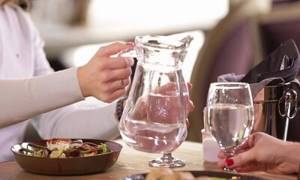
You need to drink only clean, still water. The maximum you can add to it is a few drops of lemon juice, mint leaves or a piece of ginger.
Sweet soda, compote - this can already be considered food, since it contains a lot of calories.
What is the energy density of foods and how to calculate it?
Energy density is the amount of energy (or calories) per gram of food. If you eat foods that are low in energy density, you will be able to eat more of these foods without going overboard on calories. This is a great way to lose weight and control the amount of food you eat without feeling terribly hungry.
Products with low energy density are soups, rice and other products that absorb water during cooking, as well as products that contain a large amount of water in their raw form - vegetables and fruits. Fiber-rich foods, such as whole grain breads and cereals, and low-fat foods have low energy density.
